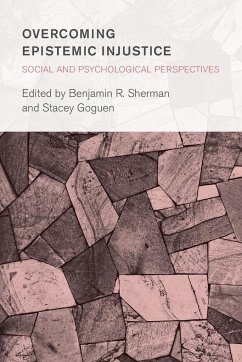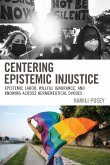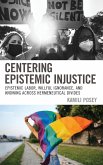Overcoming Epistemic Injustice
Social and Psychological Perspectives
Herausgeber: Sherman, Benjamin R.; Goguen, Stacey
Overcoming Epistemic Injustice
Social and Psychological Perspectives
Herausgeber: Sherman, Benjamin R.; Goguen, Stacey
- Broschiertes Buch
- Merkliste
- Auf die Merkliste
- Bewerten Bewerten
- Teilen
- Produkt teilen
- Produkterinnerung
- Produkterinnerung
This volume draws together cutting edge research from the social sciences to find ways of overcoming the unconscious prejudice that is present in our everyday decisions, a phenomenon coined by the philosopher Miranda Fricker as 'epistemic injustice'.
Andere Kunden interessierten sich auch für
![Overcoming Epistemic Injustice Overcoming Epistemic Injustice]() Overcoming Epistemic Injustice165,99 €
Overcoming Epistemic Injustice165,99 €![Centering Epistemic Injustice Centering Epistemic Injustice]() Kamili PoseyCentering Epistemic Injustice48,99 €
Kamili PoseyCentering Epistemic Injustice48,99 €![Centering Epistemic Injustice Centering Epistemic Injustice]() Kamili PoseyCentering Epistemic Injustice108,99 €
Kamili PoseyCentering Epistemic Injustice108,99 €![Global Development, Ethics, and Epistemic Injustice Global Development, Ethics, and Epistemic Injustice]() Anna MalavisiGlobal Development, Ethics, and Epistemic Injustice108,99 €
Anna MalavisiGlobal Development, Ethics, and Epistemic Injustice108,99 €![Epistemic Injustice Epistemic Injustice]() Miranda FrickerEpistemic Injustice28,99 €
Miranda FrickerEpistemic Injustice28,99 €![Epistemic Injustice and Violence Epistemic Injustice and Violence]() Epistemic Injustice and Violence27,99 €
Epistemic Injustice and Violence27,99 €![Epistemic Injustice Epistemic Injustice]() Miranda FrickerEpistemic Injustice141,99 €
Miranda FrickerEpistemic Injustice141,99 €-
-
-
This volume draws together cutting edge research from the social sciences to find ways of overcoming the unconscious prejudice that is present in our everyday decisions, a phenomenon coined by the philosopher Miranda Fricker as 'epistemic injustice'.
Hinweis: Dieser Artikel kann nur an eine deutsche Lieferadresse ausgeliefert werden.
Hinweis: Dieser Artikel kann nur an eine deutsche Lieferadresse ausgeliefert werden.
Produktdetails
- Produktdetails
- Verlag: Rowman & Littlefield Publishers
- Seitenzahl: 334
- Erscheinungstermin: 27. Juni 2019
- Englisch
- Abmessung: 229mm x 152mm x 20mm
- Gewicht: 544g
- ISBN-13: 9781786607065
- ISBN-10: 1786607069
- Artikelnr.: 55496906
- Herstellerkennzeichnung
- Libri GmbH
- Europaallee 1
- 36244 Bad Hersfeld
- gpsr@libri.de
- Verlag: Rowman & Littlefield Publishers
- Seitenzahl: 334
- Erscheinungstermin: 27. Juni 2019
- Englisch
- Abmessung: 229mm x 152mm x 20mm
- Gewicht: 544g
- ISBN-13: 9781786607065
- ISBN-10: 1786607069
- Artikelnr.: 55496906
- Herstellerkennzeichnung
- Libri GmbH
- Europaallee 1
- 36244 Bad Hersfeld
- gpsr@libri.de
Benjamin R. Sherman is a full-time lecturer in philosophy at Brandeis University, specializing in ethics, epistemology, and the overlap between the two fields. Stacey Goguen is an Assistant Professor of philosophy at Northeastern Illinois University, specializing in feminist philosophy, philosophy of science, and social epistemology.
Introduction Ben Sherman / Part I: Managing Psychological Tendencies / 2.
Becoming Less Unreasonable Mark Alfano / 3. Overcoming Stereotypes: What
Could Our Goals Be? Stacey Goguen / 4. Conceptualizing Sexual Assault:
Hermeneutical Injustice and Epistemic Resources Audrey Yap / 5. Structural
Thinking and Epistemic Justice Saray Ayala and Nadya Vadilyeva / 6. The
Inevitability of Aiming for Virtue Jen White and Alex Madva / 7. How to
Stop Perpetuating Epistemologies of Ignorance Emily McWilliams / Part II:
Curing Epistemic Injustice in Healthcare / 8. Epistemic Microaggressions
and Epistemic Injustices in Clinical Medicine Lauren Freeman and Heather
Stewart / 9. Epistemic Injustice and Stereotype Mapping in Psychiatry
Elianna Fetterolf / 10. Returning to the 'There Is': PTSD, Phenomenology &
Systems of Knowing Mary Catherine McDonald / 11. Are Naturalistic
Conceptions of Health Epistemically Unjust? Ian Kidd and Havi Carel / 12.
Epistemic Injustice in Surgery: The Impact on Women Surgeons and Trainees
Katrina Hutchison / Part III: Arresting Epistemic Injustice in the Legal
and Correctional Systems / 13. Reconstructing Legal Judgement in the Face
of Epistemological Injustice Michael Sullivan / 14. The Episteme and
Epistemic Injustice Lissa Skitolsky / 15. Carceral Medicine and Prison
Abolition: Trust and Truth-telling in Correctional Healthcare Andrea Pitts
/ 16. Epistemic Injustice, Willed Ignorance, and the Treatment of Pregnant
Women in Canadian Provincial Prisons Harry Critchley / Part IV: Learning to
Overcoming Epistemic Injustice in Academia and Education / 17. Teaching as
Epistemic Care Casey Rebecca Johnson / 18. When Testimony Isn't Enough:
Implicit Research as Epistemic Injustice Lacey Davidson 19. Afterword
Miranda Fricker
Becoming Less Unreasonable Mark Alfano / 3. Overcoming Stereotypes: What
Could Our Goals Be? Stacey Goguen / 4. Conceptualizing Sexual Assault:
Hermeneutical Injustice and Epistemic Resources Audrey Yap / 5. Structural
Thinking and Epistemic Justice Saray Ayala and Nadya Vadilyeva / 6. The
Inevitability of Aiming for Virtue Jen White and Alex Madva / 7. How to
Stop Perpetuating Epistemologies of Ignorance Emily McWilliams / Part II:
Curing Epistemic Injustice in Healthcare / 8. Epistemic Microaggressions
and Epistemic Injustices in Clinical Medicine Lauren Freeman and Heather
Stewart / 9. Epistemic Injustice and Stereotype Mapping in Psychiatry
Elianna Fetterolf / 10. Returning to the 'There Is': PTSD, Phenomenology &
Systems of Knowing Mary Catherine McDonald / 11. Are Naturalistic
Conceptions of Health Epistemically Unjust? Ian Kidd and Havi Carel / 12.
Epistemic Injustice in Surgery: The Impact on Women Surgeons and Trainees
Katrina Hutchison / Part III: Arresting Epistemic Injustice in the Legal
and Correctional Systems / 13. Reconstructing Legal Judgement in the Face
of Epistemological Injustice Michael Sullivan / 14. The Episteme and
Epistemic Injustice Lissa Skitolsky / 15. Carceral Medicine and Prison
Abolition: Trust and Truth-telling in Correctional Healthcare Andrea Pitts
/ 16. Epistemic Injustice, Willed Ignorance, and the Treatment of Pregnant
Women in Canadian Provincial Prisons Harry Critchley / Part IV: Learning to
Overcoming Epistemic Injustice in Academia and Education / 17. Teaching as
Epistemic Care Casey Rebecca Johnson / 18. When Testimony Isn't Enough:
Implicit Research as Epistemic Injustice Lacey Davidson 19. Afterword
Miranda Fricker
Introduction Ben Sherman / Part I: Managing Psychological Tendencies / 2.
Becoming Less Unreasonable Mark Alfano / 3. Overcoming Stereotypes: What
Could Our Goals Be? Stacey Goguen / 4. Conceptualizing Sexual Assault:
Hermeneutical Injustice and Epistemic Resources Audrey Yap / 5. Structural
Thinking and Epistemic Justice Saray Ayala and Nadya Vadilyeva / 6. The
Inevitability of Aiming for Virtue Jen White and Alex Madva / 7. How to
Stop Perpetuating Epistemologies of Ignorance Emily McWilliams / Part II:
Curing Epistemic Injustice in Healthcare / 8. Epistemic Microaggressions
and Epistemic Injustices in Clinical Medicine Lauren Freeman and Heather
Stewart / 9. Epistemic Injustice and Stereotype Mapping in Psychiatry
Elianna Fetterolf / 10. Returning to the 'There Is': PTSD, Phenomenology &
Systems of Knowing Mary Catherine McDonald / 11. Are Naturalistic
Conceptions of Health Epistemically Unjust? Ian Kidd and Havi Carel / 12.
Epistemic Injustice in Surgery: The Impact on Women Surgeons and Trainees
Katrina Hutchison / Part III: Arresting Epistemic Injustice in the Legal
and Correctional Systems / 13. Reconstructing Legal Judgement in the Face
of Epistemological Injustice Michael Sullivan / 14. The Episteme and
Epistemic Injustice Lissa Skitolsky / 15. Carceral Medicine and Prison
Abolition: Trust and Truth-telling in Correctional Healthcare Andrea Pitts
/ 16. Epistemic Injustice, Willed Ignorance, and the Treatment of Pregnant
Women in Canadian Provincial Prisons Harry Critchley / Part IV: Learning to
Overcoming Epistemic Injustice in Academia and Education / 17. Teaching as
Epistemic Care Casey Rebecca Johnson / 18. When Testimony Isn't Enough:
Implicit Research as Epistemic Injustice Lacey Davidson 19. Afterword
Miranda Fricker
Becoming Less Unreasonable Mark Alfano / 3. Overcoming Stereotypes: What
Could Our Goals Be? Stacey Goguen / 4. Conceptualizing Sexual Assault:
Hermeneutical Injustice and Epistemic Resources Audrey Yap / 5. Structural
Thinking and Epistemic Justice Saray Ayala and Nadya Vadilyeva / 6. The
Inevitability of Aiming for Virtue Jen White and Alex Madva / 7. How to
Stop Perpetuating Epistemologies of Ignorance Emily McWilliams / Part II:
Curing Epistemic Injustice in Healthcare / 8. Epistemic Microaggressions
and Epistemic Injustices in Clinical Medicine Lauren Freeman and Heather
Stewart / 9. Epistemic Injustice and Stereotype Mapping in Psychiatry
Elianna Fetterolf / 10. Returning to the 'There Is': PTSD, Phenomenology &
Systems of Knowing Mary Catherine McDonald / 11. Are Naturalistic
Conceptions of Health Epistemically Unjust? Ian Kidd and Havi Carel / 12.
Epistemic Injustice in Surgery: The Impact on Women Surgeons and Trainees
Katrina Hutchison / Part III: Arresting Epistemic Injustice in the Legal
and Correctional Systems / 13. Reconstructing Legal Judgement in the Face
of Epistemological Injustice Michael Sullivan / 14. The Episteme and
Epistemic Injustice Lissa Skitolsky / 15. Carceral Medicine and Prison
Abolition: Trust and Truth-telling in Correctional Healthcare Andrea Pitts
/ 16. Epistemic Injustice, Willed Ignorance, and the Treatment of Pregnant
Women in Canadian Provincial Prisons Harry Critchley / Part IV: Learning to
Overcoming Epistemic Injustice in Academia and Education / 17. Teaching as
Epistemic Care Casey Rebecca Johnson / 18. When Testimony Isn't Enough:
Implicit Research as Epistemic Injustice Lacey Davidson 19. Afterword
Miranda Fricker








